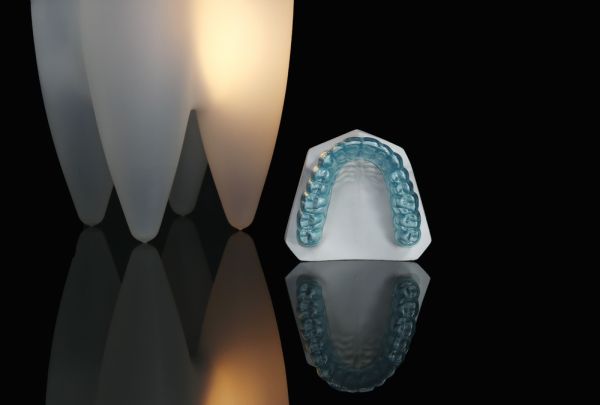What Can a Night Guard Protect My Teeth Against?

Also called a mouthguard, a night guard is used to protect the teeth from the impacts of grinding or clenching during sleep, and from damage when playing sports. They are also effective for snoring and obstructive sleep apnea.
It may be hard to fathom how a plastic material can stop the pain and damages caused by teeth grinding. The fact is that nightguards have been proven to be highly effective for protecting the teeth. Patients must understand that the night guard will only shield the teeth, but will not stop the grinding and clenching. Bruxism is the result of another condition which needs to be treated.
The dentist will create a custom night guard for the patient using an impression of their teeth. This ensures the night guard fits snugly on the teeth, better than over-the-counter mouthguards, and makes them more comfortable to wear and harder to dislodge during sleep. Although they are more expensive than the mouthguards sold in stores, they are usually more effective.
Functions of the night guard
The night guard is effective for protecting your teeth against teeth grinding:
Also called bruxism, teeth grinding is a condition where the patient grinds their upper and lower teeth against each other. This could cause different problems, such as jaw pain, tooth pain and sore gums. It can also damage the teeth. Wearing a night guard before sleeping will help separate the upper and lower teeth, so they do not get damaged from clenching and grinding.
Damage from teeth grinding
The tooth enamel, which is the protective layer of the teeth, suffers the bigger brunt of teeth grinding. Failure to treat bruxism promptly could cause stress fractures or jagged lines on the enamel. This often appears as vertical hairline cracks on the enamel with a light-brown appearance. Although a stress fracture may not cause the tooth to break, if neglected, the crack could worsen.
Chips or cracks on the enamel can be detrimental to the patient's oral health. Enamel contains no living nerves or cells — which means once it is damaged, it cannot repair itself. Damaged enamel means less protection for the tooth. The tooth contains an internal layer called the dentin, and beneath that is the soft tissue called the dental pulp, which contains the nerves and blood vessels. Once the enamel is worn and the tooth gets cracked, any activity in the mouth could affect the pulp and cause irritation and inflammation. Exposure of the pulp also makes it vulnerable to bacterial infections.
Simply put, tooth damage caused by teeth grinding at night predisposes the patient to the risk of tooth decay, gum disease, oral infections and even tooth loss. Sometimes, an extensive dental restoration or procedure may be required for relief.
Final note
In most situations, a custom-fitted night guard is preferable for bruxism. Stock mouthguards rarely stay in place and can be uncomfortable, which could make sleeping difficult. Patients that are dealing with teeth grinding need to visit their dentist to get a night guard to protect their teeth.
Request an appointment here: https://www.gablesexceptionaldentistry.com or call Gables Exceptional Dentistry at (305) 203-4132 for an appointment in our Coral Gables office.
Check out what others are saying about our services on Yelp: Read our Yelp reviews.
Related Posts
Invisalign® is a popular alternative to straightening teeth with traditional braces. It allows patients to improve the alignment of their teeth without ruining the appearance of their smile with a bunch of metal brackets and wires.These removable plastic aligner trays can be used to treat a wide range of orthodontic issues like crooked, crowded, abnormally…
Clear braces and other orthodontic advances make teeth straightening treatment more attractive to many patients. From clear aligners to ceramic braces, these innovative treatments allow patients to align their smiles without noticeable metal brackets and wires. Thanks to these alternatives, teeth straightening has become more accessible to those who want to avoid traditional metal braces.Traditional…
Anyone with damaged, decayed, discolored, or misaligned teeth might be an ideal candidate for dental crowns. Also called caps, these restorations have various uses in dentistry and are often combined with other restorations like implants and bridges.A dental crown is a tooth-shaped shell that covers up the visible part of a tooth, protecting it against…
Dental veneers or dental crowns may be viable solutions to improve your teeth's appearance and functionality. These cosmetic dental treatments offer different approaches and benefits while addressing various dental issues. Discover which of these two transformative options is most suitable for you.Dental veneers are thin porcelain or composite resin shells that the dentist will custom-design…
